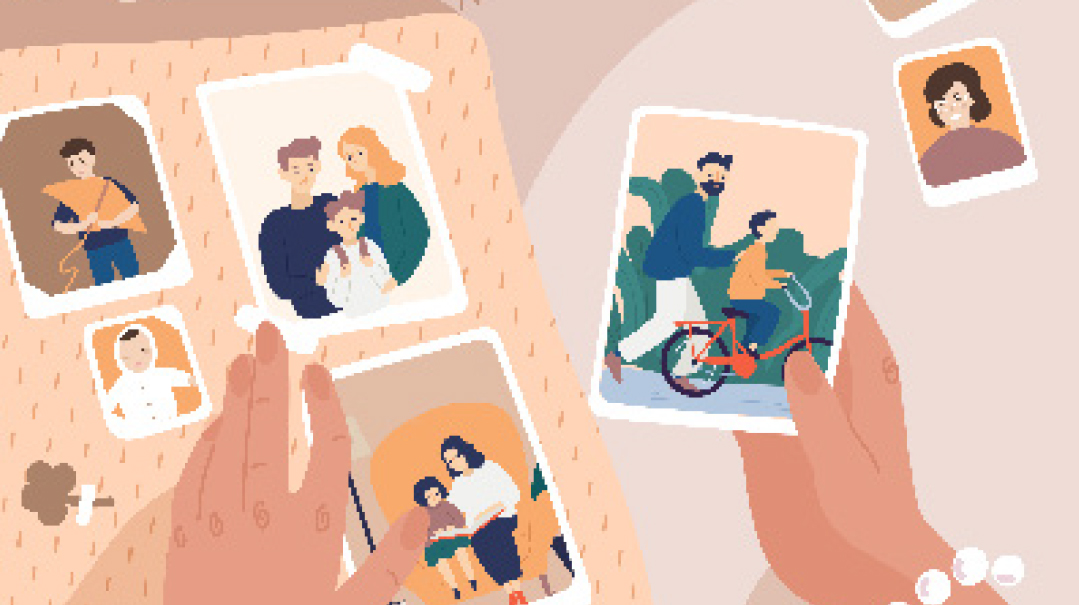Step Out: 15 Accounts


T
he Big Picture
Avigail Rubin
It’s important for her to look good today. Not just because it’s a wedding a close relative and a long-awaited celebration. But also because everyone will be there and everyone includes a family she loves and cherishes but differs from fundamentally.
It’s a spectrum of course religious nonreligious and traditional but her little branch of the extended family is the only one boasting black hats and sheitels and skirts past the knee tights year-round and kashrus stringencies that no one else has heard of. The classic “black” family against a multicolored backdrop.
For years now it’s been her goal to bring them closer without lowering her standards to find the common thread. She wants to demonstrate how more unites them than divides them that they are one family in one nation with One G-d and though paths diverge they can still walk together.
Until they can’t.
There’s an extra place laid on the family table at this wedding for a relative’s almost-fiancé. Tall dark and decidedly non-Jewish. The rest of her family the shades of gray and white and in-between have come to resignation and an acceptance of sorts. No they’re not happy but look she’s an adult she’s had a painful life and we have to respect her choices.
Her rav guides her to the response she and her immediate relatives should take: They are not married. They are not engaged. The halachah is clear; they need to be dissuaded. But she is in no position to do so no one will listen.
So don’t dissuade with words she is told. But do nothing — nothing! — that gives the impression that you consent to a non-Jew joining your family.
She thinks that doing nothing will be easy. But it’s not.
The chuppah is over the bride a-sparkle with joy and diamond. The happy couple disappears on a cloud of music and dreams and she nibbles on fruit from the buffet until they’re called for photos.
Bride and groom parents siblings their spouses nieces and nephews now a full family picture — in-laws included. Out of the corner of her eye she sees the relative — far gone alone determination in her eyes — signal her would-be fiancé forward.
Watching from the middle of the pose she holds her breath.
The man steps up gingerly joins at one side. No one blinks.
She looks around desperately for help. How can this be allowed to happen? How can her family welcome a stranger into their midst to pose and laugh and share a moment of such joy?
She moves aside signaling to family members. Do something. (Excerpted from Family First Issue 562)
Emerging from My Cocoon
S. Itzkowitz
I’m a creature of habit if there ever was one. Change and me? No. My sister used to say I’d need therapy if I ever got a new phone number.
When I was getting engaged (Eeek! Change!) I was happy I could keep my current job. True it would entail a fairly long commute but the drive didn’t bother me I loved where I worked (and it certainly helped that they loved me too) and I made a pretty decent salary… so why well change?
But on the night of my vort as my chassan and I sat outside and talked he dropped the bombshell. He’d been learning in Eretz Yisrael when we met and he very badly wanted to go back and continue learning there.
“What’s wrong with Lakewood?” I asked naively. “Doesn’t everyone just go learn in Lakewood?”
But he had never even been to Lakewood let alone learned there and it took me a few days to realize that bochurim aren’t wind-up toys that you can just plunk down in any beis medrash give a little twist and they’ll sit and shuckel.
I really did want to be wherever my new husband would be learning best.
But…
But…
But I really loved my job.
But I really wanted to be near my family.
But I had no idea where we’d live or how I’d find a job.
And… and… and…
(Did I mention how much I dislike change?)
(Excerpted from Family First Issue 562)
Taking Cover
Yael Schuster
Early spring 1916 Northern France
Private Max (Mordechai) Gutman glances at his surroundings and exhales loudly. Things could be worse. Is he proud to be a foot soldier in the Imperial German Army on a bloody conquest on behalf of Kaiser Wilhelm II? Not exactly. He has seen horrors and suffered privations he wouldn’t wish on the enemy. But today at least he doesn’t seem to be in danger of being blown to smithereens.
His company had arrived in this small French village late morning and were greeted with absolute silence. Like the other villages they’d overtaken the past few weeks the locals had fled in panic. Max’s unit had spent the day going house to house looking for snipers gathering supplies and setting up a small army post.
“Fifteen-minute toilet and cigarette break!” Hauptmann Becker had barked. So here he is now leaning against the wall of an abandoned post office on the village square his trusty Mauser rifle at his side just in case. Max reaches into his pockets hoping for a ginger candy. He pulls out half an egg biscuit instead.
His mind wanders as it unfailingly does when he has a moment to think to more comforting landscapes. Dear Rivkah back home in Ellingen surely worrying if her husband of two years is alive or dead maimed or whole. Sweet baby Yitzchak whom he has seen only once at his pidyon haben while home on a short leave.
His gaze travels beyond the village edge. Amid the greenery he sees a ghoulish ashen moonscape remnant of a fearsome battle. The sun has sunken low behind it as if eager to get away.
The sun! Max realizes with a start that it’s close to shkiah and he hasn’t davened Minchah. He turns into a small street hoping to find a spot hidden from view. Jewish soldiers routinely bear the brunt of taunting and worse and he isn’t about to offer his platoon fodder. Just the other day his friend Ernst got a black eye and broken nose when someone noticed him reciting Bircas Hamazon. (Excerpted from Family First Issue 562)
Sense & Sensitivity
Liba Mendelson
My heart leaped as I ripped open the large invitation.
“A T.I.M.E. invites you to a Shabbos of chizuk for couples experiencing primary infertility.”
I’d been married for a number of years without children and the annual A T.I.M.E. Shabbaton was the highlight of my life. I’d shut myself out of the cruel world around me so 48 hours in a safe bubble was a dream come true. It was the only social event I could attend without coming home in tears. No one was expecting. No baby talk. No blathering about milestones clothing and schools. The speeches would be chock-full of encouragement chizuk and hope. I couldn’t wait.
My elation deflated when I noticed the keynote speaker: a world-famous mechanech well known for his riveting divrei Torah and witty stories. I’d grown up loving his derashos. But now entrenched in this very difficult life challenge my worry went into overdrive. The chance he’d accidentally launch into a shpiel on chinuch habanim was high. To me the Shabbaton was supposed to be a sterile environment without a hint of a mention of children. A little slip of the tongue could ruin my elevated experience.
The director of A T.I.M.E. — a friend of mine — assured me the rabbi would steer away from sensitive material. Still skeptical I felt on edge from the moment I arrived at the hotel.
Friday passed without incident. Shabbos candlelighting elevated us to new heights; the emotions in the room were palpable. Kabbalas Shabbos held the weighty atmosphere of Yom Kippur as over a hundred couples on the same turbulent journey davened together. After a festive meal at the sumptuous oneg a few long-suffering veterans of infertility relayed comical stories and we laughed heartily. Suddenly one of the yungeleit piped up “Nu Rabbi X a devar Torah?”
I stiffened. This had not been part of the plan! His keynote speech was most likely meticulously crafted and thoroughly edited but an off-the-cuff speech? He could slip up. I sat tensely as he launched into a lengthy discourse on the meaning of that particular Shabbos as it related to our collective nisayon. It was pretty inoffensive but as I found myself nodding off I decided to call it an early night and left.
Shabbos morning following an emotionally charged Shacharis I was having a blast flitting from table to table at the lavish kiddush. Then the speeches started and I became antsy pacing the floor as we heard one speaker then another. After the third speaker — when I was jumping out of my skin — the men honored Rabbi X with another impromptu speech. I groaned but forced myself to listen.
I had to admit he was living up to his reputation. The audience sat spellbound as he spun tale after tale eliciting laughter gasps and sighs. Soon my attention began wandering until through my hazy thoughts I suddenly heard the words “baby stroller.” What? I was jolted back to reality as Rabbi X launched into a lengthy hilarious story about a good deed gone awry that involved a baby-equipment gemach. Startled I searched the table for shocked faces. To my surprise everyone else appeared unperturbed.
Fired up I left the kiddush room and assaulted a group of ladies chatting in the lobby. “Did you hear what Rabbi X just said?” I hissed incensed. “He had the gall to tell a story about a baby stroller! He forgot who his audience is! I knew he would say something wrong!” I bristled with righteous indignation. (Excerpted from Family First Issue 562)
Oops! We could not locate your form.













